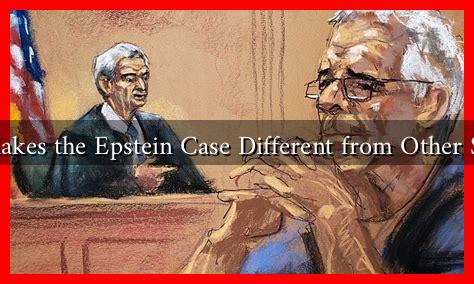-
Table of Contents
What Makes the Epstein Case Different from Other Scandals
The Jeffrey Epstein case has captivated the public’s attention and sparked widespread outrage, not only due to the heinous nature of the crimes but also because of the complex web of power, privilege, and systemic failure it reveals. Unlike many other scandals, the Epstein case intertwines issues of sexual abuse, human trafficking, and the involvement of high-profile individuals, making it a unique and multifaceted situation. This article explores the distinctive elements of the Epstein case that set it apart from other scandals.
The Scale and Nature of the Crimes
At the heart of the Epstein case is a staggering scale of alleged sexual abuse and exploitation. Epstein was accused of running a sex trafficking ring that involved numerous underage girls, some as young as 14. This level of organized criminal activity is not commonly seen in other scandals, which often focus on individual misconduct rather than systemic abuse.
- Victim Count: Estimates suggest that Epstein may have abused hundreds of girls over several decades.
- Recruitment Methods: Epstein allegedly used a network of associates to recruit vulnerable young women, often luring them with promises of modeling opportunities or financial support.
This systematic approach to exploitation highlights a disturbing trend in how powerful individuals can manipulate and abuse those with fewer resources, making the Epstein case particularly egregious.
High-Profile Connections
Another factor that distinguishes the Epstein case is the extensive list of high-profile individuals connected to him.
. Epstein’s social circle included politicians, celebrities, and business moguls, raising questions about complicity and accountability among the elite.
- Political Figures: Epstein had ties to former Presidents Bill Clinton and Donald Trump, among others.
- Business Leaders: Figures like Leslie Wexner, the former CEO of L Brands, were closely associated with Epstein, leading to scrutiny of their business dealings.
The involvement of such prominent individuals has led to a broader discussion about the influence of wealth and power in the justice system, as well as the potential for cover-ups and lack of accountability.
Systemic Failures and Legal Controversies
The Epstein case also highlights significant systemic failures within the legal and law enforcement systems. In 2008, Epstein received a controversial plea deal that allowed him to serve just 13 months in a county jail, despite facing serious charges of sex trafficking. This leniency has been widely criticized and has raised questions about the effectiveness of the justice system in handling cases involving powerful individuals.
- Plea Deal Controversy: The 2008 deal was negotiated without the knowledge of Epstein’s victims, leading to accusations of injustice.
- Federal Investigation: The renewed investigation in 2019, which ultimately led to Epstein’s arrest, revealed the extent of the failures in the initial handling of the case.
These legal controversies have sparked public outrage and calls for reform, emphasizing the need for a more equitable justice system that holds all individuals accountable, regardless of their status.
The Role of Media and Public Perception
The Epstein case has also been unique in its media coverage and public perception. The extensive reporting on the case has kept it in the public eye, leading to widespread discussions about sexual abuse, consent, and the exploitation of vulnerable individuals.
- Documentaries and Investigative Reports: Numerous documentaries and articles have been produced, shedding light on the complexities of the case.
- Social Media Activism: The case has sparked movements advocating for victims’ rights and greater awareness of human trafficking.
This level of engagement has transformed the Epstein case into a broader societal issue, prompting discussions about accountability and the need for systemic change.
Conclusion
The Jeffrey Epstein case stands out from other scandals due to its scale, the involvement of high-profile individuals, systemic failures in the justice system, and the significant media attention it has garnered. As society grapples with the implications of this case, it serves as a stark reminder of the need for vigilance in protecting vulnerable individuals and ensuring that justice is served, regardless of wealth or status. The Epstein case is not just a story of one man’s crimes; it is a reflection of deeper societal issues that demand our attention and action.
For further reading on the Epstein case and its implications, you can visit The New York Times.





